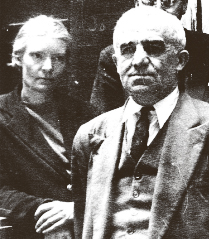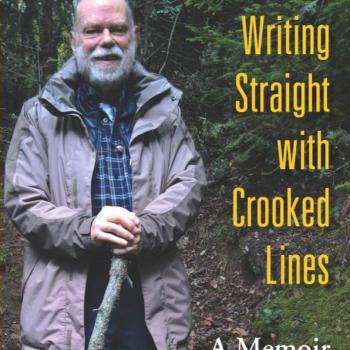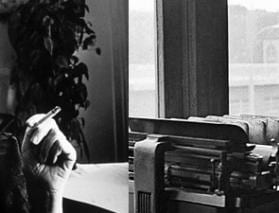 Welcome to the first post on Solidarity Hall’s new group blog, The Dorothy Option. Our title is taken from a June 2011 post of mine at Vox Nova titled, “Catholic Citizenship and the Dorothy Option.” For the historical record, it’s worth noting that my use of the now ubiquitous “Option” device appears to have been the first. Rod Dreher didn’t propose his Benedict Option, now the gold standard of the breed, until December 2013. In the wake of the BenOp, we’ve been treated to alternative forms of the meme ranging from the Dominic Option to the Wilberforce Option. While part of me feels moved to apologize for having introduced “Option” talk in the first place, I know that my short piece at Vox Nova had nothing to do with this proliferation. If you have “Option” fatigue, you can safely blame Rod Dreher.
Welcome to the first post on Solidarity Hall’s new group blog, The Dorothy Option. Our title is taken from a June 2011 post of mine at Vox Nova titled, “Catholic Citizenship and the Dorothy Option.” For the historical record, it’s worth noting that my use of the now ubiquitous “Option” device appears to have been the first. Rod Dreher didn’t propose his Benedict Option, now the gold standard of the breed, until December 2013. In the wake of the BenOp, we’ve been treated to alternative forms of the meme ranging from the Dominic Option to the Wilberforce Option. While part of me feels moved to apologize for having introduced “Option” talk in the first place, I know that my short piece at Vox Nova had nothing to do with this proliferation. If you have “Option” fatigue, you can safely blame Rod Dreher.
Still, I think that there are important distinctions to be made between the Benedict Option and the Dorothy Option, beginning with their respective inspirations. St. Benedict lived in the 6th Century A.D., a time very different than our own.  The Servant of God Dorothy Day lived and worked within the lifetime of anyone now past 35 years old. St. Benedict decamped from Rome to live an eremitic and then cenobitic life in the Simbruini mountains; and later founded the great monastery at Monte Cassino. Dorothy was a 20th Century journalist, a single mother, and a convert to Catholicism. She decamped from the radical literary salons of Greenwich Village into a life of voluntary poverty and service among the urban poor of New York City. St. Benedict wrote his enduring Rule and founded the seminal Benedictine Order. Dorothy, herself a Benedictine Oblate, co-founded the lay Catholic Worker Movement and probably should have written a Rule of some sort. St. Benedict’s legacy is stamped on Western Civilization from the 6th Century on. Dorothy’s legacy is still being realized, most directly in places like Casa Juan Diego (Houston), Trinity Hills (Missouri), the Mustard Seed Catholic Worker (Massachusetts) and St. Joseph House (Manhattan); but also in the lives of tens of thousands of contemporary Christians who, inspired by her witness, seek to reconcile the radical demands of the Gospel with life in a global, technocratic, and neoliberal empire.
The Servant of God Dorothy Day lived and worked within the lifetime of anyone now past 35 years old. St. Benedict decamped from Rome to live an eremitic and then cenobitic life in the Simbruini mountains; and later founded the great monastery at Monte Cassino. Dorothy was a 20th Century journalist, a single mother, and a convert to Catholicism. She decamped from the radical literary salons of Greenwich Village into a life of voluntary poverty and service among the urban poor of New York City. St. Benedict wrote his enduring Rule and founded the seminal Benedictine Order. Dorothy, herself a Benedictine Oblate, co-founded the lay Catholic Worker Movement and probably should have written a Rule of some sort. St. Benedict’s legacy is stamped on Western Civilization from the 6th Century on. Dorothy’s legacy is still being realized, most directly in places like Casa Juan Diego (Houston), Trinity Hills (Missouri), the Mustard Seed Catholic Worker (Massachusetts) and St. Joseph House (Manhattan); but also in the lives of tens of thousands of contemporary Christians who, inspired by her witness, seek to reconcile the radical demands of the Gospel with life in a global, technocratic, and neoliberal empire.
The fact is that 80 years ago Dorothy Day and Peter Maurin embraced the Benedict Option, updated it for the modern world, and showed us how to begin building a new civilization in the shell of the old, a civilization of love characterized by nonviolence and the corporal and spiritual works of mercy.
What we hope to do with The Dorothy Option is take this Benedictine-Catholic Worker vision and explore its implications and possibilities for those of us living in the early 21st Century. What does hospitality mean in our personal lives? What is the meaning of solidarity with workers in a post-industrial “service” economy? How can we help nurture alternative economic thinking into flesh and blood reality? Can we re-found local communities based on the common good? Can we break the yoke of consumerism, materialism, practical atheism, political compromise, and militarism, even if just in our own lives and the lives of those we touch?
The Dorothy Option is not a Catholic Worker project, per se, although we have great affection for and close working relationships with several members of that movement. Catholic Worker voices will always be welcomed here. But one of our underlying convictions is that Dorothy Day and Peter Maurin now belong to the whole Church and, indeed, to all Christians. Their work and witness cannot and should not be confined to the visible movement they began, a movement which has waxed and waned throughout the years, especially since Dorothy’s death in 1980. The principles they stood for and the practices they modeled are not just an “option” to be taken up by Catholic Workers, but an imperative for all who would follow Jesus Christ in the 21st Century.
But let’s start at the beginning, with that 2011 essay. I re-present it in its original form, with dates and locations unchanged. It doesn’t matter. Four years ago or four years hence, the battles and stakes will be the same. And so will the opportunities for conversion, for change, for embracing the Dorothy Option.
Last Monday’s Republican debate at St. Anselm’s College in New Hampshire was billed by CNN as the first major event of the 2012 presidential campaign. The choice of a Benedictine institution was weirdly appropriate because the debate also kicked off our quadrennial Catholic scrap over electoral politics. A year from now, the battle will be fully engaged. The two camps will have emerged from their respective quarters to savage each other on the deck of the ship of state, contending for control of the rudder, seeking to define each other down the plank and into the Davy Jones Locker of American Church history.
“Conservatives” and Republicans will come armed with abortion, ESCR, and gay marriage. They’ll hurl accusations of indifference to the unborn and the sanctity of marriage. They’ll intone “SOCIALISM” at every turn, and warn darkly of hidden agendas aimed at remaking the Church in the image of MoveOn.org. “Liberals” and Democrats will come armed with war and torture, capital punishment, and market idolatry. They’ll hurl accusations of indifference to the poor, the sick, and the marginalized. They’ll intone “CORPORATIONS” at every turn, and warn darkly of hidden agendas aimed at remaking the Church in the image of the Tea Party. Both sides will engage in hand-to-hand combat over the meaning and application of terms like “intrinsic evil,” “remote cooperation,” and “prudential judgment,” all the while accusing their opponents of distortion, dishonesty, or simple ignorance.
Then, on Election Day + 1, winners will celebrate the return or arrival of truth and justice, while the vanquished will foretell dire calamities soon to be visited on the land. I used to engage in these war games, and enjoyed watching others engage in them. I fought under the conviction that the soul of the Church – at least in America – was being contested.
Don’t get me wrong: my intent is not to trivialize or dismiss either the importance of the issues contested or the legitimate passions of the contestants. It is true that from a Catholic perspective there is a fundamental problem with a party that aggressively supports both the killing of the unborn and a revolutionary redefinition of marriage. And it is also true that from that same perspective there is a fundamental problem with a party that aggressively seeks to dismantle the social safety net in the name – acknowledged or not – of a Darwinian economic ideology, and which uncritically celebrates war, torture, and empire. The deeper I drove into the authentic teaching of the Church and its implications for living as both citizen and Christian, the less satisfied I became with limitations of a binary political system defined by Democrat and Republican, liberal and conservative. In fact, over time I came to see that the system isn’t binary at all, but unitary, with two distinct but ultimately complimentary and mutually supporting modes of expression. Moreover, I came to the conviction that neither mode is adequate to channel the radical demands imposed upon us by the Gospel. The Democratic and Republican parties are two dead ends in the same blind alley; but the essential problem isn’t the parties themselves at all. At the heart of the issue is what the Servant of God Dorothy Day called “this filthy, rotten system” itself.
And so, I recommend the “Dorothy Option.” Eschew both parties. Refuse to participate in their rigged game of electoral politics. Refuse to fight their wars. Pack a lifeboat with as many people as you can and row away from the ship of state and the staged battle being waged on its deck. The ship is going down anyway, and it will take all the partisans and courtiers from both parties with it.
Are you a Catholic Tea Partier, sick of government debt and hubris? You should be, but you should also understand that government and the parties that serve it were captured, whole and entire, by their corporate co-conspirators a long time ago. Are you a Catholic MoveOn member, tired of corporate control of the political process? You should be, but you should also understand that the American government was designed to serve commercial interests above all else, and it always will.
The “Dorothy Option” is not about retreating into isolated enclaves like Ave Maria, Florida, or indulging in the kind of spiritual navel-gazing that so often marks New Age and fundamentalist Christian communities. Instead, it means a deeper, more radical engagement with the world through a life centered on service to the poor and marginalized. It also means resistance – including the use of non-violent civil disobedience – against systems that generate violence or offend the dignity of the human person.
Dorothy was no socialist. She mistrusted the concentration of state power and even opposed the erection of a bureaucratic welfare state, which she thought was violent at its core and dehumanizing in its effects. But, of course, she was no capitalist either. She equally mistrusted private concentrations of power, especially corporations, which she believed commodified human persons and impoverished the many for the sake of a few. Instead, Dorothy sought to live the Gospel in all its dimensions, without having to shoehorn the Faith into one party or another, or put it at the service of a system she saw as sinful.
And she lived her convictions. The Catholic Worker communities founded by Day and Peter Maurin embraced voluntary poverty. They never registered as “tax exempt” organizations. They never sought government or corporate grants. They never charged more than $.01 for the newspaper they published. When it was time to march in protest, they marched. When it was time to be carted off to jail, they went peacefully. When it was time to feed the poor, they started ladling until the soup was gone. Dorothy even famously returned to the City of New York a check for interest on the forced sale of a Worker property, explaining in a cover letter that the Church has always taught against the taking of interest. Her conclusion to that letter is as succinct a description of the “Dorothy Option” as one could hope to find: “Please also be assured that we are not judging individuals, but are trying to make a judgment on the system under which we live and with which we admit that we ourselves compromise daily in many small ways, but which we try and wish to withdraw from as much as possible.”
Taking the “Dorothy Option” is difficult, and I’ll admit to compromising “daily in many small ways,” although I am trying. One way we can begin is by deciding to think like Catholics, not conservatives or liberals; by deciding to live like Christians, not Republicans or Democrats, or even Americans. We can begin by refusing to fight with one another, and by choosing to see identification with either party, and indeed with the system they both serve, as the cooperation with evil that it is.












